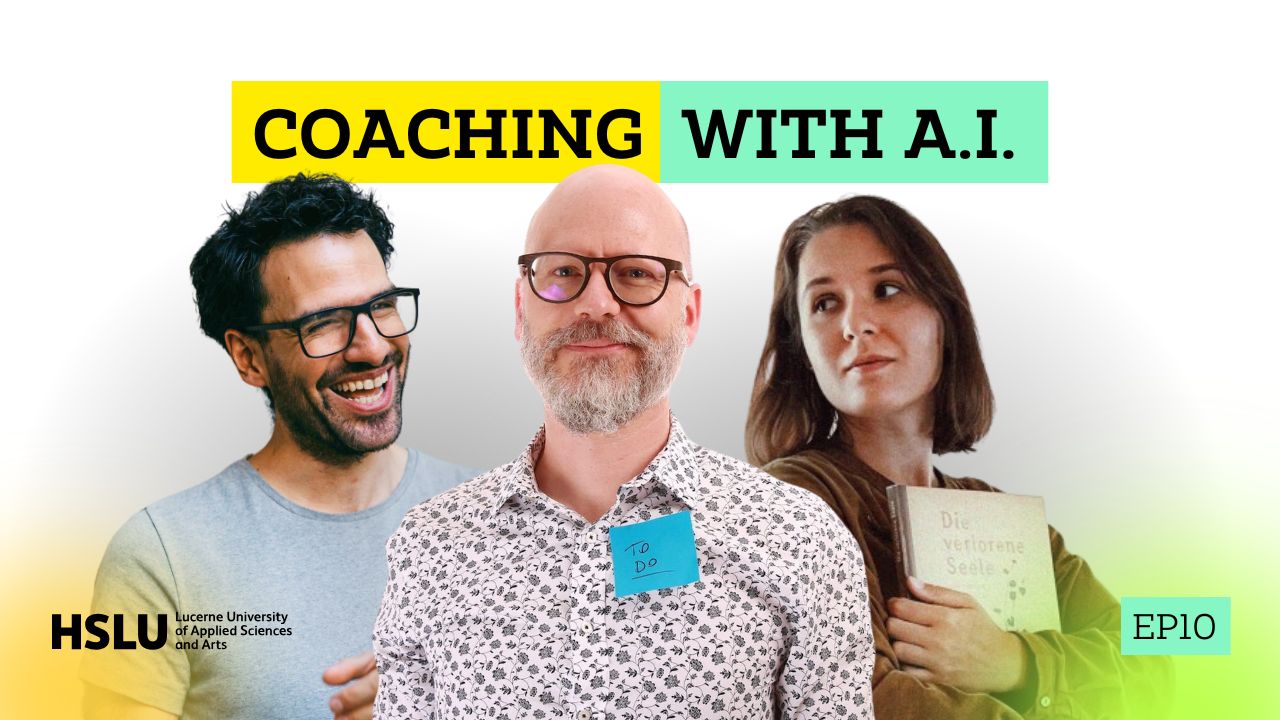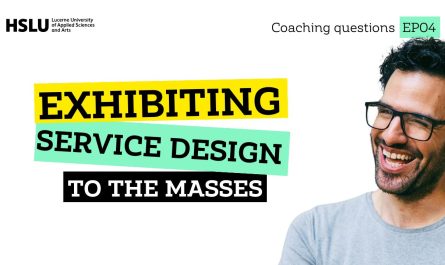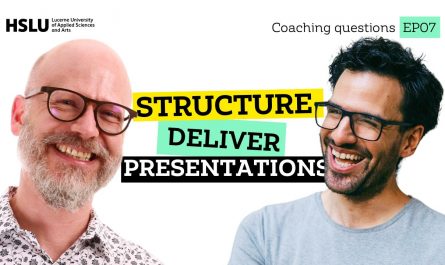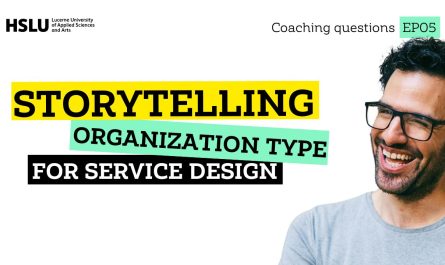Tetyana Kalyuzhna and her colleagues prototyped a concept of coaching in a box that blends both the human and AI. In this coaching notes episode we’ve invited Tetyana to share:
- the ideas behind that prototype,
- what she learned from it
- and how she uses AI today for Design and Personal Coaching.
In this 15-minute conversation we also explore some of the limitations of the coaching format that we use within the Service Design Master and how we might make it evolve in the future.
Video transcript
This transcript was fully generated using Descript. The transcript wasn’t corrected. Which means it can be pretty creative, funny or wrong at moments.
Introduction and Guest Welcome
Daniele: Welcome, everyone. I’m excited because today I’m not just speaking with my mate Andy, but we have also Tetyana in the room to speak about a few things coaching related and also because it’s that time of the century, AI but before we jump into all of that juicy stuff.
Tetyana: Welcome, Tetyana. Such a big pleasure to have you here. For the few ones that don’t know you yet, could you do a tiny introduction? Hi, my name is Tetyana and I study second year, part time, Service Design in Hochschule Luzern.
Tetyana’s Project on AI in Coaching
Tetyana: A few weeks ago, you posted on LinkedIn, a prototype you made around the idea of do we need humans for coachings? Could you maybe share a few thoughts about that exploration First of all, it was not only my project, but alsomy colleagues during the focus module, Redesigning Human Simon Leachie and Anja, with whom we studied together. And the idea was to think what if something would happen. So we came to things we struggle the most.
So it was coaching also. And we made a brief We did a brief, short interview with professors also, like, because we know what we’re struggling about during the coaching, but we also wanted to know the other side of the moon. And the idea was to make the first one when you don’t have to choose a coach.
So it was like the machine which gives you a coach and you have to talk to it. we made a box, forgot the name but the boring one is coaching in a box. you come inside and you have this podium where you put this portrait of your coach, and you choose the mode.
it was inspiration from Daniele. we modified it like you want to talk with a hungry, angry, happy. professor, for example.
Exploring AI’s Role in Coaching
Tetyana: we were thinking if we collect all data from all interviews you have shared with us on YouTube and other platforms and bring it to a AI ChatGPT, so if we choose, for example, Andy and we choose it like Andy who had already a coffee in the morning and start to ask you questions. So the ChatGPT will sound like Andy Polaine. So it will humanize it a bit because like only talking to a ChatGPT is a bit weird, but if you know that someone is behind, it could work. But also we’re thinking about if we’ll, put it in the first step of coaching when most of students have basic questions and they’re repetitive all the time.
So we were thinking like, what if Andy Polaine or you Daniele will answer the same question, like which you answer all the time the same way. So we will get this not from you, but from this AI, for example, and it will take a boring part from your coaching away and then after we get all answers we come to a nice part when you meet you in life and you also get all this our coaching In PDF or your email so you already know what was going on about our ideas and it will make you more prepared So I think it’s like a short introduction of what we were working about
Daniele: Thanks so much for sharing that. So you did that and you reflected on this idea. What did you learn out of it?
Tetyana: I think the first thing we found out after talking to some other people, like professors, that they didn’t know that we have some tricks, So if you want to have a chill coach, which is this one, if you want to be pushed, which is,
so yeah, it was really funny.
They didn’t know that. And then we also found out that we still are into real communication because when you’re always stuck with your computer it’s really difficult to be only on the online things. But the other thing I came up recently, we are trying to simplify our life so much. And some people I know, some classmates are really scared sometimes to come to a coaching because you’re not prepared or a problem of language. if we simplify it in a way so we have GPT and we can study.
Talk Japanese, Korean, whatever. we will avoid this challenging to meet in person and to be judged and whatever, so how, how we will be and what the way of our thinking will be in the future then.
Student Perspectives on AI Coaching
Andy Polaine (he/him): From your point of view as a student, I can imagine a kind of sense of, I don’t know, time saving of going, well, look, I I really just have a quick question and it’s a Daniele question or an Andy question.
So I’m going to go to, you know, Andy GPT can you imagine yourself doing that, but actually when you want to work through something you would work with us for real? Or do you think you would work with us as a kind of prompt for you? Like you’re getting us to ask you questions, the ChatGPT version of us.
Tetyana: I would for sure ask ChatGPT because it’s fun. I don’t know how long I would do it, but if the scene will really appear, I would try it. As a student, I can say, yeah, I’ve been struggling with the timing because also like working and it’s, I’m trying for one month to book a coaching with you. And always you have slots when I have to work.
So maybe in case I need to hear your thoughts, I will if it’s a short one, use a ChatGPT but it would be funny if I come to you and they like, you know, ChatGPT, Andy told me that.
Andy Polaine (he/him): I had this conversation yesterday, where we were talking with some people about Claude AI, and was saying it was very useful as a writing assistant because she was writing something, and I know Oliver Eichenstein is one who’s quite to the idea, or, you know really hates the idea of GPT and AI writing stuff from scratch, the idea of it being a writing assistant, where actually what you do is you ask it and say, look, I’m writing this thing. Ask me some questions about this so that it stimulates me. I can, I can imagine that being quite useful. When it comes to coaching though, there’s quite a lot else that is going on.
Human vs AI in Coaching
Andy Polaine (he/him): That’s from our side that we’re doing when we are coaching you that I, is all about the perception of where the person is at, seeing where they’re getting excited, upset or feeling afraid and all those kinds of things, which ChatterPT is not going to pick up on. And also for me, you know, I kind of think out loud, as I’m talking, it starts to make sense and that’s where I kind of will pull things that’s much more random than I think ChatGPT would manage, or at least I’d like to think it’s much more random,
Tetyana: Those kind of AIs are really probability engines. I just came to one question to you because I know how it looks like from my side, but what if CharityPT would be like a coaching? how would you feel if somebody would talk to Andy Polaine through ChatGPT asking questions?
Andy Polaine (he/him): I don’t care in that sense, but I wouldn’t put my name to it, I wouldn’t mind, it’s up to you, it’s up to anyone, I’m not the boss of anyone, to tell them how they want to be coached or, or learn. Don’t think that it would be me there’s a lot of sensibilities that go on when I’m coaching, if you think about what’s going on. You’ve sucked in a whole bunch of available information and presumably, it’s not just my information that it’ll be based on Because any of those training models are based on other training models. Right. So there’s an additional bit to the way it understands my text and how does it understand my text.
’causeit’s been trained on a whole lot of other stuff already. And so in that construct, it’s inferring kind of probability of the next word that’s going to be said. It’s not really intelligent at all. It’s not able to understand meaning. the structure of that is this idea that it is a very information exchange kind of experience. I think for some things it is. if you put into Andy GPT, can you give me some books on OKRs or something, probably are going to say the same thing that I say all the time. If there’s some other stuff where someone’s really blocked and struggling to shape their project, there’s quite a lot of collaborative synthesis that goes on during coaching I think you wouldn’t get out of just that sort of information based structure. I don’t feel personally slighted, but I do think you wouldn’t be getting me.
Emotional Aspects of Coaching
Daniele: You had some struggles with the coachings that you wanted to fix. What are these struggles that you would like to fix?
Tetyana: I think from what I experienced with my colleagues is that we still don’t know how really coaching should looks like. I mean, yeah, we are coming with ideas and you help us to develop them and point where we can go and whatever. But also it feels like not enough time. As I said, and also sometimes you feel you need help, but you cannot find a question behind what you want to ask exactly.
And sometimes you have a feeling that you just waste the time and don’t come to anything. But in a month you start to understand what you talked about before. I mean, my personal is what we talked about last year with Andy. I just started to understand right now what you asked me about.
Andy Polaine (he/him): I’ve heard that quite often, where people say, oh, you know, a year later, I realized something that you said.
Tetyana: I think with students it’s because we have so many new courses and more knowledge coming and when it fits somewhere in our head we understand what was going on.
Andy Polaine (he/him): So you talked about feeling like we need to be prepared and the time is short There is a natural power structure or dynamic in our relationship, as lecturers and students, as much as we might kind of try and flatten that out you know, you are, there’s an age thing, there’s an experience thing, there’s also the, the fact that we are your lecturers, at some point we grade you and all of those things, and whether that’s very conscious or not, and I wondered whether, talking to the ChatGPT version of one of us, would feel more comfortable because you can basically tell us what to doand there isn’t that same dynamic as if you’re sitting opposite one of us.
Tetyana: I just came up to an answer right now, for me, it would be like, you know preparation before real coaching. I will go through all questions with ChatGPT and then I will come to you.
Andy Polaine (he/him): Right. so you use it to actually work out what you want to ask us for real, or you would wait until. the ChatGPT version of us was frustrating, you weren’t really getting what you needed and then you would go live.
Tetyana: maybe I will go briefly through all my questions. I need to know an answer.
Future of AI in Coaching
Tetyana: And if some of them. will be fixed to me, then I will have like not a hundred questions, but only five I can ask during the live coaching, because some others could be like very bold and I will get answer very fast.
If it would be like a ChatGPT based on your personality, or someone else, not a general one.
It’s very time saving because we have like now a lot of time pressure of like working, studying having our personal life and we’ll try to like, make this time shorter. Maybe take out a part of enjoying just the conversation of coaching.
Daniele: There are already a few very interesting lessons in here, where I feel there is this interesting part in your use of AI, I’d like to use it to get a technical answer to a knowledge question. how do I do a blueprint? What are things to look for when I prepare for an interview, which is knowledge.
here are a few links, here are a few thoughts and this can be easily trained on either Andy’s knowledge or my knowledge or even having, a bot which is Dandy, which will be like the two of us bots together and it could answer all of your service design questionsAnd so that’s one part that I see. the other part that I feel is super interesting in your, usage is this aspect, of, Preparation, having also some space to reflect and share your thoughts. there are two questions that come to mind how do we create a space where students feel comfortable, to also know,
don’t have time pressure
and we can just have a chat.
I can share, how I feel today.
How do you plan to use AI more or less in the future for all of coaching related things?
Tetyana: I, I ask it usually like about some recommendation connected to my project ideas or what I can read more and where, but I find the answers are not so useful sometimes because they are repetitive andloose. It’s an idea, like an inner emotion I’m working about, but I find it’s a good combination also with With online and offline coaching because I can be service prepared, draft,
yeah, I already have some more knowledge based on AI.
And then they come to you for this emotional part, because it’s also a big part of each project of us, We work with humans, not with robots,
Final Remarks and Farewell
Daniele: I’d like to say again:
A big thank you to you, Tetyana, for sharing your thoughts here. I really appreciate you being critical about how the coachings are formatted, but also how, you try to get the tools that you need to complement what you get out of these coachings. I find this a very inspiring way of working, not being either all human or all machine. There is something in the middle that is quite beautiful and finding that mix that is very personal is quite inspiring.
So, once again, a big thank you to you, and a big thank you to Andy. Maybe, Tetyana, is there a place where, people who are interested in getting a great service designer in their team can reach out to you?
Tetyana: LinkedIn profile would work.
Daniele: Wonderful. Thank you so much
again,
Tetyana: I just remembered the name of the box. People gave it a confession box
Andy Polaine (he/him): Aha.
Tetyana: and you can confess during the coaching.
Andy Polaine (he/him): Should we have a little partition? We should maybe set one of those up in the studio. Where we can just sit there and there’s a little hatch.
and then saying you have to do three Maria.
Yeah, you have to do three customer journeys.



